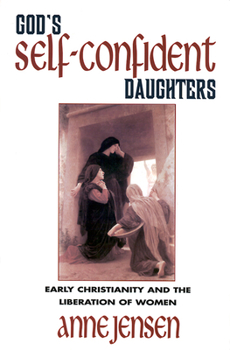Gods Self-confident Daughters
Select Format
Select Condition 
Book Overview
In this study, Anne Jensen provides an exhaustive account of the many roles that women played in the early church (confessors, martyrs, prophetesses, and teachers) and their subsequent marginalization... This description may be from another edition of this product.
Format:Paperback
Language:English
ISBN:0664256724
ISBN13:9780664256722
Release Date:October 1996
Publisher:Westminster John Knox Press
Length:380 Pages
Weight:1.30 lbs.
Dimensions:1.2" x 6.0" x 9.0"
Customer Reviews
2 ratings
A Must for Femininsts or Those Interested in Church History
Published by Thriftbooks.com User , 19 years ago
"God's Self Confident Daughters" is a must read for anyone who wonders how the preachings of Jesus Christ devolved into an all-too-often misogynist Christianity. "Daughters" is a scholarly book. It goes over ancient documents with a fine toothed comb. As such, it will be an easier read for readers familiar with early church history. That warning should not put anyone off from reading the book; one should know what to expect, though. This is *not* pop history -- it's light years from something like "The Da Vinci Code." It is serious scholarship. Jensen introduces the reader to a world in which women preached, women prophesied, women made important contributions to theology, and, most importantly, believers saw Christ in their women leaders. Step by step, Jensen analyzes how misogynists, in no way representing the teachings of Jesus Christ, carefully denigrated and ultimately erased the very important women in early Christianity. Predictable steps were taken to wipe out the female presence. Women leaders were denounced as prostitutes. They were denounced as seducers. They were denounced as insane. Finally, their names were taken away from them. Ultimately, they were completely erased. Important names -- female names -- that were once well known to early Christians, such as Thecla, Blandina, and Prisca, go unspoken today. Sadly, we are far more familiar with the misogynist theologians who did everything they could to destroy these women's legacies. One step in reclaiming a *complete picture* of early church history and the very important women who played vital roles in passing Christianity down to humankind today is the purchasing, reading, and passing on of this important book. There are, no doubt, Blandinas and Theclas among us today; knowledge of the facts in this book will help them to thrive and to keep Christianity vital.
women and church history
Published by Thriftbooks.com User , 20 years ago
Jensen's book is a translation of her Habilitationsschrift from Tubingen in 1992 and was stimulated by the "Frau und Christentum" project with which she was associated in previous years. In line with the aim of that project,Jensen takes up its call to reconstruct "the reality of feminine life," to make women "visible as subjects of historical activity" (p. xi).Jensen acknowledges that such research is partial but not biased; bias, she might argue, was more characteristic of the older apologetic approaches that claimed the Greco-Roman environment for the suppression of early Christianity's emancipatory tendencies. That Jensen throughout emphasizes "facts" is the book's strength as well as its weakness: "strength" in that Jensen carefully sifts through the textual material remaining for her subject and period (largely pre-Constantinian), "weakness" in that there is little reckoning with the literary constructedness of the documents considered. Hence Jensen tends to understand the documents as more reflective of "reality" than would the present reviewer or many other Anglo-American scholars. Jensen organizes her material into four substantive chapters: women in the church histories, women in martyrdom, charismatic prophetesses, and women represented as teachers (with emphasis on those usually categorized as Gnostics). An epilogue emphasizes the struggle between hierarchical and egalitarian patterns in early Christianity. Here, women are seen as complicit with ecclesiastical authority in allowing their already achieved emancipation (in the GrecoRoman environment) to be taken from them. Useful appendices give some of the important texts, and list by category all the women mentioned in the church histories. In her chapter on the church histories, Jensen notes that Eusebius mentions more women than do Socrates, Sozomen, and Theodoret combined, with women martyrs holding pride of place. Especially surprising is the lack of attention to women ascetics in Sozomen's history, since he emphasizes ascetic and monastic phenomena. The church histories also appear to devalue women's education, lack of learning being represented as a "specifically feminine virtue" (p. 56). Gradually increasing hierarchical control over women's ecclesiastical activities is well documented. Jensen argues that many Christians of the era accorded women martyrs the same rank and privileges as their male counterparts. Jensen's discussion of Montanist prophetesses is especially useful for its extensive treatment of the known literary evidence. Several commonly held views on Montanism are here laid to rest (for example, that the early movement was motivated by a strong expectation of the imminent end of the world). Following the suggestion of Heinrich Kraft, Jensen argues that Montanus was not the central prophetic authority in the early days of the movement. Rather Prisca was "the real initiator and inspirer of the movement" (p. 167). Not women's participation in particular, but the deva






